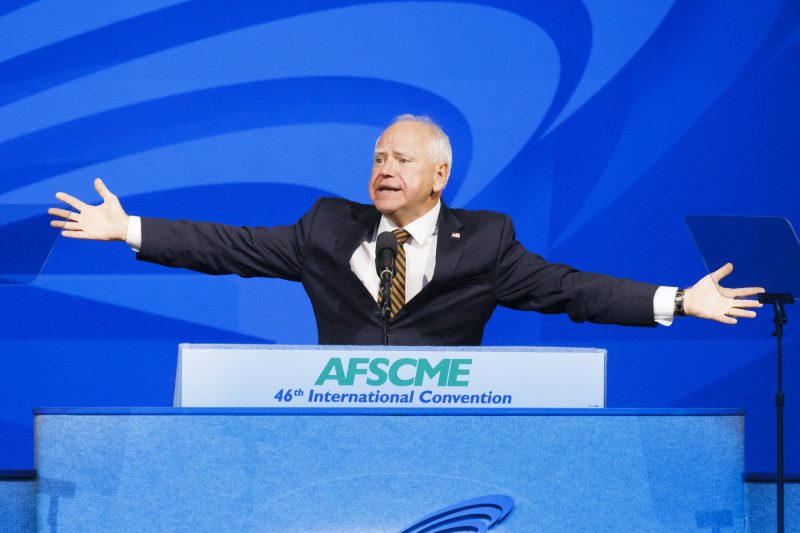“I’ll tell you, his running mate, I don’t know if that was a value-add to this campaign or not, but he’s one of four senators, four, that has never cast a vote on a pro-worker bill in his life. Not once. A stopped clock’s right twice a day, this guy can’t get it right once, not once, for workers.”
— Democratic vice-presidential nominee Tim Walz, in a speech in Los Angeles to a conference of the American Federation of State, County and Municipal Employees (AFSCME), Aug. 13
Walz, the Minnesota governor, used an address to the largest public employee union to make a slashing attack on Donald Trump’s running mate, Sen. JD Vance of Ohio. He declared that Vance “never cast a vote on a pro-worker bill in his life. Not once,” earning boos from the audience. For good measure, he added: “The only thing those two guys know about working people is how to work to take advantage of them.”
Is there evidence to back up these statements?
The Facts
We were struck that Walz said that Vance was one of four senators who had never cast a vote for a pro-worker bill. That was rather specific and sounded as if he was borrowing from a legislative scorecard compiled by an organization or interest group.
When asked about Walz’s comment, the Harris-Walz campaign pointed to an AFL-CIO scorecard, which lists four senators — all Republicans — who have “lifetime records” of zero percent for voting on bills or appointments deemed important by the AFL-CIO, the largest federation of unions.
But here’s the rub: all four senators — Vance, Katie Boyd Britt of Alabama, Eric Schmitt of Missouri and Pete Ricketts of Nebraska — are freshmen. So the scorecard covers only one year — 2023 — and only seven votes were counted. Five of those votes concerned nominations for Biden administration appointments, such as former Maryland governor Martin O’Malley to be Social Security commissioner. The only votes on policy issues — bills — concerned a resolution to block Biden’s student-loan relief program and an amendment to promote access to voting.
Vance voted “no” in five cases and did not cast a vote in two others. The AFL-CIO, on its website, does not display a scorecard for 2024 votes and did not respond to a request for a scorecard on Vance’s record this year.
For context, the average Senate Republican has a score of 3 percent.
In other words, this is thin gruel. Walz attacks Vance for not supporting any pro-worker bills, but the claim is based on just two votes in a single year. One might question whether student-loan relief and voting access are “pro-worker” issues, but this is the AFL-CIO’s scorecard. They characterize it as “the definitive grade of whether your representative voted to protect or take away your rights.”
Walz framed it as Vance never casting a vote for any pro-worker bill, not just bills important to the AFL-CIO. Unusually for a Republican, Vance joined a picket line during the auto strike organized by the United Auto Workers and said he is “not a big fan” of right-to-work laws that curtail unions’ ability to organize. But he has opposed the Protecting the Right to Organize (PRO) Act, a major labor priority that would weaken such state laws.
Still, we identified at least two pro-worker bills that Vance voted for, which by Walz’s definition would at least be a stopped clock.
Railway Safety Act. Vance is a co-sponsor of the bill, intended to respond to the 2023 Norfolk Southern train derailment in East Palestine, Ohio, and he voted for it in December when it was approved by the Senate Commerce Committee. The bill, which would impose new safety requirements and enhance fines, has not yet come to a floor vote yet because of a filibuster threat. Rail unions have held rallies calling for it to be passed, and it has won the support of the International Association of Sheet Metal, Air, Rail and Transportation Workers’ Transportation Division, the Transport Workers Union of America, the Brotherhood of Maintenance of Way Employees, the Brotherhood of Railroad Signalmen, the Brotherhood of Locomotive Engineers and Trainmen, the American Train Dispatchers Association, the International Brotherhood of Boilermakers, Iron Ship Builders, Blacksmiths, Forgeres and Helpers, the United States Conference of Mayors, the International Brotherhood of Teamsters, the International Brotherhood of Electrical Workers, and the International Association of Machinists.
Radiation Exposure Compensation Reauthorization Act. Vance was one of 20 Republicans to vote for this bill, which passed the Senate in March by a vote of 69-30. The bill, which had the support of uranium miners, would have extended the period for filing claims under the 1990 Radiation Exposure Compensation Act, improved compensation for workers involved in uranium mining, and added parts of Arizona, Utah and Nevada to the program. The House did not act, though, with House Speaker Mike Johnson (R-La.) citing the expense and lack of Republican support. The old law lapsed in June, though Democrats promise to revive it next year.
As for Walz’s jab that “the only thing those two guys know about working people is how to work to take advantage of them,” he seems to be unfairly lumping Vance in with Trump, who was born into wealth in New York City. Vance’s best-selling memoir, “Hillbilly Elegy,” recounted being raised by his grandmother and grandfather, whom he described as union Democrats: “All politicians might be crooks, but if there were any exceptions, they were undoubtedly members of Franklin Delano Roosevelt’s New Deal coalition.” His grandfather worked at Armco steel mill and was a member of the local union, the Armco Employees Independent Federation. Vance’s uncle Jimmy was a member of the same union.
In other words, it’s rich to claim that Vance doesn’t know anything about working people. Walz knows this. In his first campaign rally with Harris, Walz said Vance “wrote a bestseller trashing that community.” That’s a matter of opinion, but it shows that Walz is aware of Vance’s working-class roots.
The Harris-Walz campaign declined to comment.
The Pinocchio Test
Speaking to a union audience, Walz swung too hard for the fences. He claimed that Vance has not voted for any “pro-worker bills,” and his source was a union report card that covered only two bills in one year. As we have documented, Vance has voted for at least two bills that helped workers and had union support. On top of that, claiming that Vance knows nothing about working people, when that’s the subject of his book, is also false.
Walz earns Four Pinocchios.
Four Pinocchios
(About our rating scale)
Send us facts to check by filling out this form
Sign up for The Fact Checker weekly newsletter
The Fact Checker is a verified signatory to the International Fact-Checking Network code of principles








